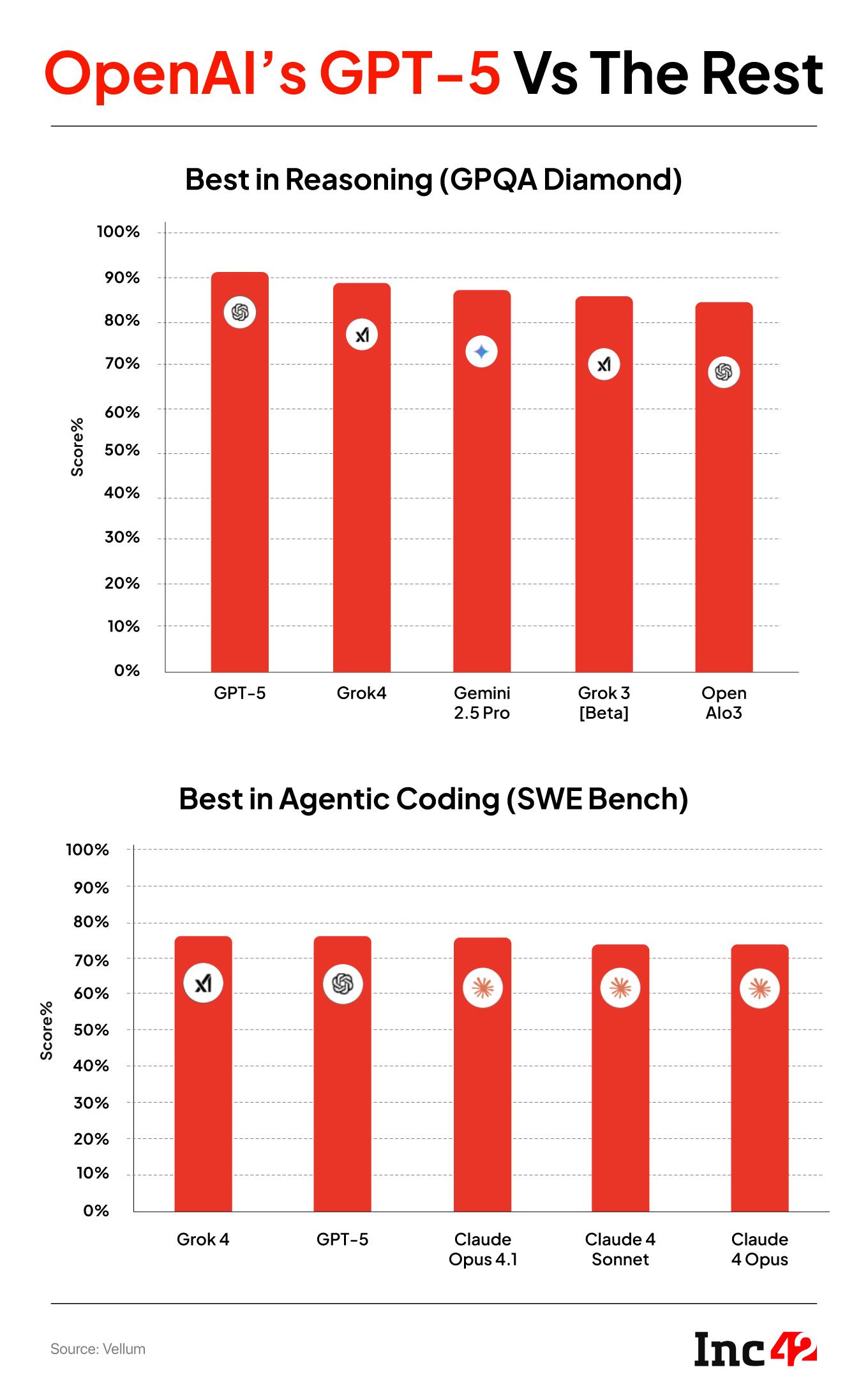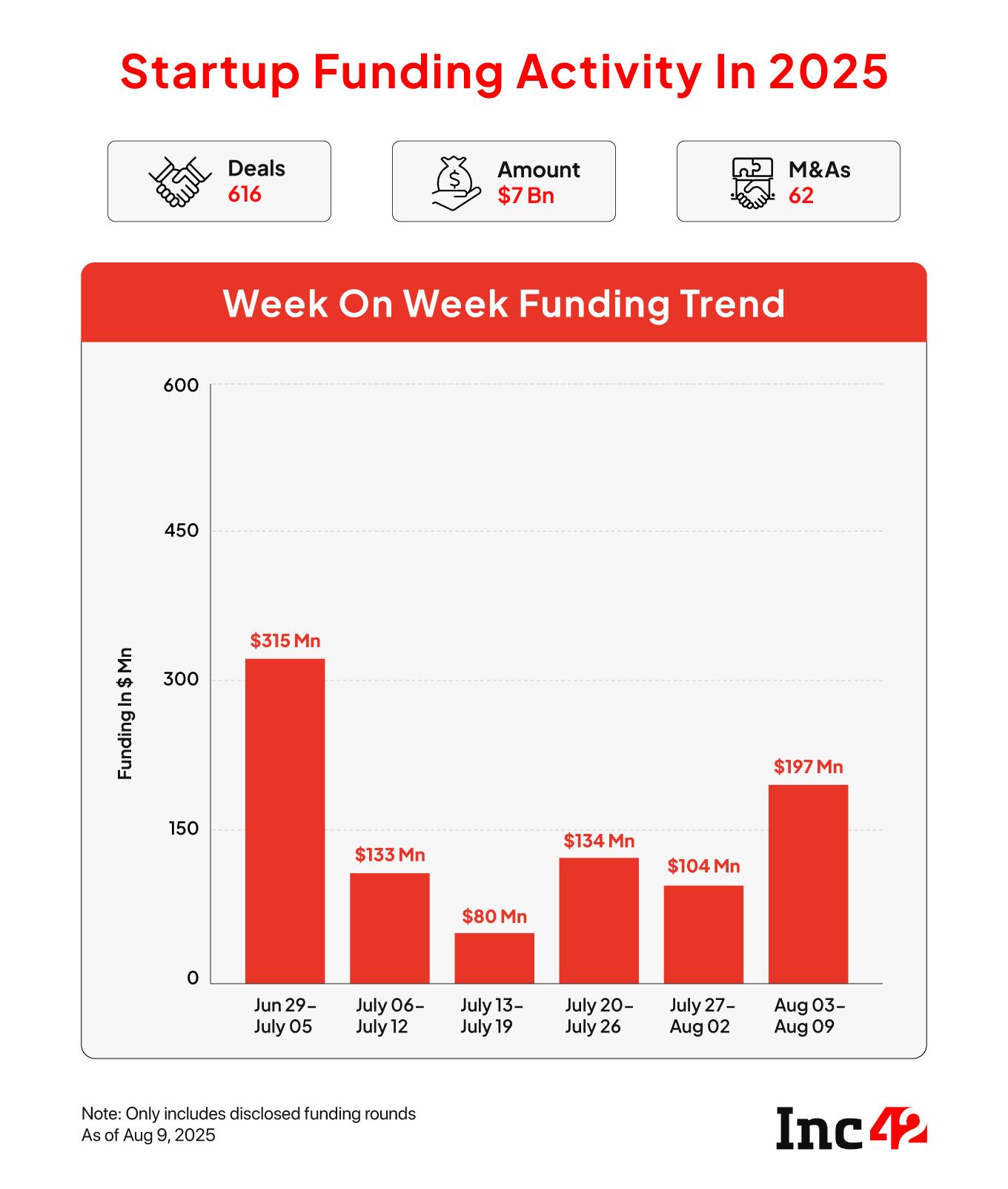Last week was nothing short of a whirlwind for AI enthusiasts. From Google DeepMind’s Genie 3 launch to Anthropic’s Claude Opus upgrade, and the most buzz-creating release of OpenAI’s highly anticipated GPT-5 — it was a full-blown storm.
And GPT-5, which OpenAI has deemed as its ‘smarter, faster, and more useful model’ possessing ‘PhD‑level intelligence’, brought with it much backlash across the user base. The company’s mathematical mess-up in its statistical charts only added fuel to the fire.
However, CEO Sam Altman and Co. continue to position GPT-5 as a massive leap forward in its AI capability. Is it so? Let’s find out this Sunday, but first, a look at the top stories from our newsroom this week:
- PhysicsWallah’s IPO Litmus Test: PhysicsWallah stands out as a rare success story in India’s beleaguered edtech landscape. At a time when BYJU’S has collapsed and Unacademy is grappling with mounting losses, the Alakh Pandey-led edtech major is gearing up for an INR 4,600 Cr IPO. Can PW’s IPO rewrite the edtech story?
- Is Ather Reving Enough: Ather must be doing something right. As the more established rival Ola Electric juggles heavy losses and a tanking market share, the recently listed EV maker improved its overall margins in Q1 FY26 by slashing its losses by 26% sequentially. But, is Ather revving enough to zoom past Ola?
- Delhivery’s Extended Profitability Streak: After remaining profitable throughout FY25, logistics startup Delhivery has started FY26 on a high note, with its highest-ever quarterly profit in Q1. Revenue rose to INR 2,294 Cr and net profit jumped nearly 68% on-year to INR 91.1 Cr. But what role did Ecom Express acquisition play in this conquest?
While the developer and AI community gushed about GPT-5, even Microsoft CEO Satya Nadella was also all in with his praises.
“It’s the most capable model yet from our partners at OpenAI, bringing powerful new advances in reasoning, coding, and chat, all trained on Azure,” his post on X read, as he also announced that the model will be launched across Microsoft 365 Copilot, Copilot, GitHub Copilot, and Azure AI Foundry.
But many experts see it as a mere catch-up game for OpenAI.
“The GPT-5 launch feels more evolutionary than revolutionary,” said Pranav Mistry, founder and CEO of TWO AI.
“It’s definitely impressive, but open models like Qwen, Kimi, and DeepSeek have already shifted the game. For OpenAI, this looks more like keeping pace than breaking new ground,” Mistry added, mirroring the sentiment of the ones who see it just as a hype cycle.
Soket AI’s CEO Abhishek Upperwal, who is building India’s own foundational model, sees GPT-5 not as a model release, but an agent framework, if you will. “In the back end, OpenAI has a lot of models that they are extensively utilising, and they have now released a unified interface for everybody to use.”
Love It Or Hate It, But GPT-5 Has ArrivedIn the last 48 hours, the internet has been abuzz with social media feeds on everything the GPT-5 is failing at, with some good reviews balancing the backlash.
However, the consensus is clear — users do not like the loss of flexibility in GPT-5 compared to GPT-4o and its lacklustre coding skill compared to Claude.
A thread titled “GPT-5 is horrible” on Reddit amassed 5,000 upvotes. Users criticised the ‘obnoxious AI-style’, reduced ‘personality’, and stricter usage limits.
Within a few hours, the OpenAI CEO brought back ‘GPT-4o’ for its paid users.

“We are going to double GPT-5 rate limits for ChatGPT Plus users as we finish rollout,” Altman posted on X. “We will let Plus users choose to continue to use 4o.”
However, many users found GPT-5 better than the previous versions for its reasoning and frontend development capabilities, along with faster generating capabilities.
All in all, the launch created quite a wave in the AI arena. But, for India, this holds a special significance. The reason is obvious — Perplexity is on the prowl to baptise one of its largest markets.
So, Is OpenAI Following Perplexity’s Lead In India?“India is our second-largest market in the world after the US, and it may well become our largest market,” said OpenAI chief executive in a media briefing following the launch.
Well, Altman is not alone. India is a major market for all — Google, Microsoft, or Perplexity.
Google recently announced a free upgrade to Gemini AI Pro for all Indian students. But what created the wave in the Indian AI ecosystem last month was the Perplexity-Airtel partnership.
Amid the intensifying competition, Perplexity opened up free access to its Pro version for Airtel customers in India. With this partnership, the AI platform essentially tried to tap into Airtel’s 350 Mn mobile users in the country.
The result, too, was instant. Last month, Perplexity claimed the top position on India’s App Store, overtaking ChatGPT and Google Gemini in free app downloads.
After the Perplexity-Airtel partnership, there is also buzz around a possible OpenAI-Jio collaboration in the Indian AI ecosystem.
It has long been acknowledged by users that Perplexity wins over ChatGPT as a tool in deep research and fact-based queries, while the latter is known for its better coding and creative writing skills.
“Perplexity has an edge… it doesn’t have its own model. And the application will get better as the different models it uses also get better. Now, there is a competition between Gemini and ChatGPT, part of which is real and part, FOMO. But, again, Google is Google,” CoRover founder and CEO Ankush Sabharwal.
Now, while the global biggies are doubling down on their India strategies, the greater question should be who’s at stake — India’s native AI startups?
Will Indian AI Natives Be Crushed Among Juggernauts?First things first — the global AI giants are targeting the Indian market because of the sheer market size on both the consumer and the B2B front, said Observe.AI’s Jithendra Vepa.
However, the top Indian AI leaders, including Vepa and Sabharwal, believe this intensifying competition is working as a facilitator for the Indian AI natives.
“LLMs are easy to copy. India needs to build solutions to solve the real-world problems, and then the people will even pay for them,” Sabharwal said.
Even as this might be perceived as a short-term loss, he believes that overall, everyone is set to gain because, ultimately, tech is evolving.
But, it goes without saying, Indian AI startups – from the application providers or LLM builders – need to learn to use this technology evolution to their advantage, take the solutions successfully to the end consumers, and solve India-specific problems where US companies (Google, OpenAI, Anthropic, et al) continue to lag.
However, they are trying and getting better in Indic languages because of the huge Indian market opportunity, even as the depth and quality continue to vary across models.
Interestingly, Upperwal sees the India focus as a “validation” rather than competition. So, even as the internet is going gaga over the newer and more powerful AI models like GPT-5, Indian AI startups do not seem to be much shaken. They are rather appreciative of the aggressively evolving competitive AI landscape.
Sunday Roundup: Startup Funding, Deals & More- Funding Galore

- Icertis Rejigs Top Deck: The SaaS unicorn has a new captain at the helm. Anand Subbaraman has taken over as the CEO, while founder Samir Bodas will assume the role of executive chairman. The leadership shake-up comes as the AI-driven contract management giant eyes a fresh $50 Mn funding round.
- Reliance Is Done With Dunzo: Three years after backing it in the quick commerce race, Reliance Retail has written off its entire INR 1,645 Cr stake in the now-defunct Dunzo. Seven months ago, Reliance Retail wrote off its $200 Mn investment in the beleaguered ecommerce venture.
- Zepto’s On Meds: The quick commerce giant has entered the 10-minute medicine delivery race with ‘Zepto Pharmacy’ in parts of Mumbai, Bengaluru, Delhi NCR and Hyderabad. The service offers prescription and OTC drugs. It has now joined rivals Blinkit, Instamart and others, vying for a slice of India’s $12.7 Bn epharmacy market.
- India’s Big Tech Nightmare: Microsoft’s sudden suspension of Nayara Energy’s cloud services over EU sanctions reignited fears about India’s heavy reliance on foreign tech giants. The episode prompts fresh calls for sovereign cloud solutions to safeguard India’s data, economy, and digital independence.
The post OpenAI’s GPT-5 Lands Amid Accelerating India AI Race appeared first on Inc42 Media.
You may also like

'I took a DNA test and discovered devastating truth my family hid for 24 years'

Labuschagne Aims To Silence 'doubters' In Push For Ashes, Puts Hand Up For Opener's Slot

Japan's Shinmoedake volcano erupts, sending ash plume

Chhattisgarh to launch 'Gaudham Yojana', cowherds to get Rs 10,916 per month

Mum comes up with 'genius' parenting hack to tire the kids out this summer






